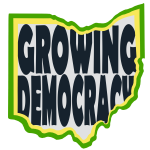Growing Democracy Blog: Special Series From Growing Democracy Fellows, Fall ’23 | ‘Decolonizing Democracy’
Theory and Practice: Queering and Decolonizing for Social Transformation
By: Courtney Green, Political Science PhD Student, Kent State University
 Increasingly, there have been calls to change the structure of academia to better reflect changing understandings of the world and to promote inclusivity in universities. Specifically, there has been a shift to decolonize or queer academia, which is connected to larger patterns within democratic movements around the world. Although complementary tools, “decolonizing” and “queering” approaches are distinct and, I argue, should not be melded into one, but should instead be used alongside each other to help support efforts to make academia more equitable. Here, I examine what it means to engage with the relationship between democracy and academia through the Growing Democracy Project.
Increasingly, there have been calls to change the structure of academia to better reflect changing understandings of the world and to promote inclusivity in universities. Specifically, there has been a shift to decolonize or queer academia, which is connected to larger patterns within democratic movements around the world. Although complementary tools, “decolonizing” and “queering” approaches are distinct and, I argue, should not be melded into one, but should instead be used alongside each other to help support efforts to make academia more equitable. Here, I examine what it means to engage with the relationship between democracy and academia through the Growing Democracy Project.
For the purposes of this blog post, I define decolonization in two ways that are equally important and interwoven. First, decolonization is the process of identifying and detangling colonial legacies that influence all aspects of life, and can encompass cultural, ecological, economic, and political legacies. Decolonization also directly challenges colonial legacies by calling for the restructuring of systems in order to address violent social hierarchies that are legacies of colonial and imperial thinking.
In the same vein, queer theory, and “queering” as an action, moves beyond traditional definitions of heteronormativity. While queerness is colloquially defined as an “atypical” performance of gender, sex, and relationships, to “queer” something can also mean “to make something strange”. As a theory (and practice), it asks us to reject restrictive dichotomies so we can question social norms. When used as a verb, queer-ing refers to the process of building capacity outside of institutions, thereby strengthening communities and restructuring systems.
Decolonization and queer theory both challenge systems of power and classification that have historically been used to create hierarchies for social control. In many ways, they mirror each other. Conflating the two, however, creates issues by overlooking the histories of oppression that they seek to transform. LGBTQ+ advocacy and academic study have historically prioritized white experiences within the community, centering whiteness in the public eye and policy debates. Consequently, non-white voices are systematically erased from public consciousness. Just because something has been queered does not mean that it has decolonized.
Entwining these two ideas has the potential for social change when done properly. Many Western conceptions of gender, sexuality, and what constitutes queer behavior, are colonial legacies. This means that working through queer theory and decolonization often requires considering their interactions to fully understand an issue. Queering and decolonizing both offer ways of questioning power structures, such as democracy and academia, which help us understand these systems.
Democratic and academic ideals have historically been defined by their institutions, which present an illusion of permanence. Academia is often characterized as rigid – while theory and knowledge may be built up over time and paradigms may shift, the ivory tower itself hasn’t changed. Similarly, the mechanisms of U.S. democracy have changed very little. Both systems rely on high levels of participation as a form of legitimacy that justifies the stagnant status quo and are irreparably tied. However, this relationship is not inherently negative, as democratic movements on university campuses have historically been a major force for social change. If the two are meant to be methods for positive social transformation, we must challenge the power dynamics within them that systematically shape the knowledge and actions they produce. Luckily, queer theory and decolonization offer pathways for change by recognizing social biases that exist within us all and influence these systems and ways of thinking.
One avenue for accomplishing these changes can be seen in The Growing Democracy Project, which works to connect academics and community members to create meaningful social change through democratic civil engagement. I initially came to this project because I was interested in expanding and reimagining democracy to better include marginalized voices in democratic processes. These questions of inclusion drew me to the political science and peace and conflict studies fields as I searched for ways to empower other queer and working class people while building global solidarity with other marginalized communities. This mission has guided my work as a human rights researcher and advocate, leading me to pursue a PhD in Political Science at Kent State University. The opportunity to work with the Project and learn alongside members of the roundtable during Fall 2023 has shown the close relationship between academia and democracy. Affecting change in both has the potential to address power imbalances. By moving discussions about social change outside the university classrooms, participants create space to reimagine democratic engagement.
Decolonial and queer imaginations of democracy extend beyond voting, donating, and representative democracy by calling for direct involvement and restructuring communal decision making. Underrepresented voices are not just uplifted and invited in for the sake of appearances, but actively included in decision making. Queering democracy gives us the tools to redefine systems and accepted paradigms of power. Meanwhile, decolonization empowers us to restructure democracy in a way that shifts the definitions of that power and who has access to it.
2023 political trends have attempted to undermine academic freedom and democratic participation, further illuminating the deep structural imbalances that exist in both U.S. democracy and the academy. Both must change in order to survive. Still, we must all face difficult questions about the nature of this survival. Decolonizing and queering systems have benefits; they hold potential for the future by developing guidelines for respect and inclusion in democratic systems that can have positive impacts on the lives of many people who have been historically excluded from decision making.
Social transformation, however, should not be limited to only what is possible inside a system. Exclusion from academic and democratic systems has not been the only source of harm; to deny that both have at times actively perpetuated harm against marginalized groups would be irresponsible. Survival is not enough for democracy and academia, the definitions of these systems must expand. This means creating space outside of the academy for education, and engaging in our communities outside of governance. By queering our worlds as we also decolonize them, we can work together towards building a future that we all have a stake in.
Learn more about the Political Science Ph.D. (Conflict Analysis & Management) program here.
